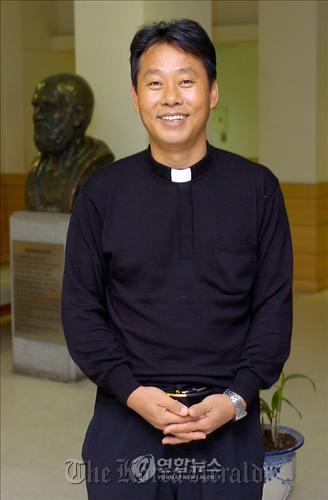The late Father Lee to receive top order for work in Sudan
Lee, a Catholic priest who worked as a doctor, teacher, conductor and architect in the small village of Tonj, Sudan, is to be posthumously awarded Korea’s highest order of civil merit.
In recognition of his service as a missionary to the African country, the government has decided to award him with the Order of Mugunghwa. President Lee Myung-bak will invite his family to the Blue House this month to award the medal, the government said. He was one of 24 medal recipients this year, chosen from the list of people recommended by Korean citizens.
Born in 1962 in Busan to a family of nine children, Lee graduated from Inje Medical School to become a doctor but changed his path after he heard an inner call to become a priest. The bright young man joined the Catholic Salesian Family and enrolled in the Gwangju Catholic University Theological College.
Lee, a Catholic priest who worked as a doctor, teacher, conductor and architect in the small village of Tonj, Sudan, is to be posthumously awarded Korea’s highest order of civil merit.
In recognition of his service as a missionary to the African country, the government has decided to award him with the Order of Mugunghwa. President Lee Myung-bak will invite his family to the Blue House this month to award the medal, the government said. He was one of 24 medal recipients this year, chosen from the list of people recommended by Korean citizens.
Born in 1962 in Busan to a family of nine children, Lee graduated from Inje Medical School to become a doctor but changed his path after he heard an inner call to become a priest. The bright young man joined the Catholic Salesian Family and enrolled in the Gwangju Catholic University Theological College.

His mission to Tonj had begun even before he became a priest. Lee felt a strong connection with the impoverished African village and left for Africa right after he was ordained in Seoul in 2001.
Lee treated hundreds of Hansen’s disease patients at all hours of the day at the village of a Dinka sub-tribe and also built a school there to teach and raise children. He was also a conductor of a 35-member brass band which delivered the message of peace and love to struggling people in the war-town country. His band, which consisted of children, made appeals to African people to believe in a better tomorrow. Many Sudanese children were conscripted into the army and died during the 22-year Second Sudanese Civil War, which ended in 2005.
“I always wanted to be with people in the world’s most devastated land. Education is the only hope for children in Sudan and the only way to change Africa,” he used to say to his friends.
During a brief holiday in Seoul in 2008, he was diagnosed with colorectal cancer at terminal stage. He wanted to go back to Tonj where his children were waiting for him to return as promised, but decided to stay for chemotherapy. On Jan. 14, less than a year at the hospital, Lee passed away, leaving his last words in English to his friends in Africa: “Don’t worry. Everything is going to be all right.”
His dramatic life story as a missionary, a doctor and a true friend to African people, became known to Koreans by a TV documentary titled “The Schweitzer of Sudan” produced by KBS last April. The documentary was later made into a film, “Don’t Cry for Me, Sudan,” and was recently screened at local movie theaters.
By Cho Chung-un (christory@heraldcorp.com)







![[KH Explains] How should Korea adjust its trade defenses against Chinese EVs?](http://res.heraldm.com/phpwas/restmb_idxmake.php?idx=644&simg=/content/image/2024/04/15/20240415050562_0.jpg&u=20240415144419)











![[Today’s K-pop] Stray Kids to return soon: report](http://res.heraldm.com/phpwas/restmb_idxmake.php?idx=642&simg=/content/image/2024/04/16/20240416050713_0.jpg&u=)